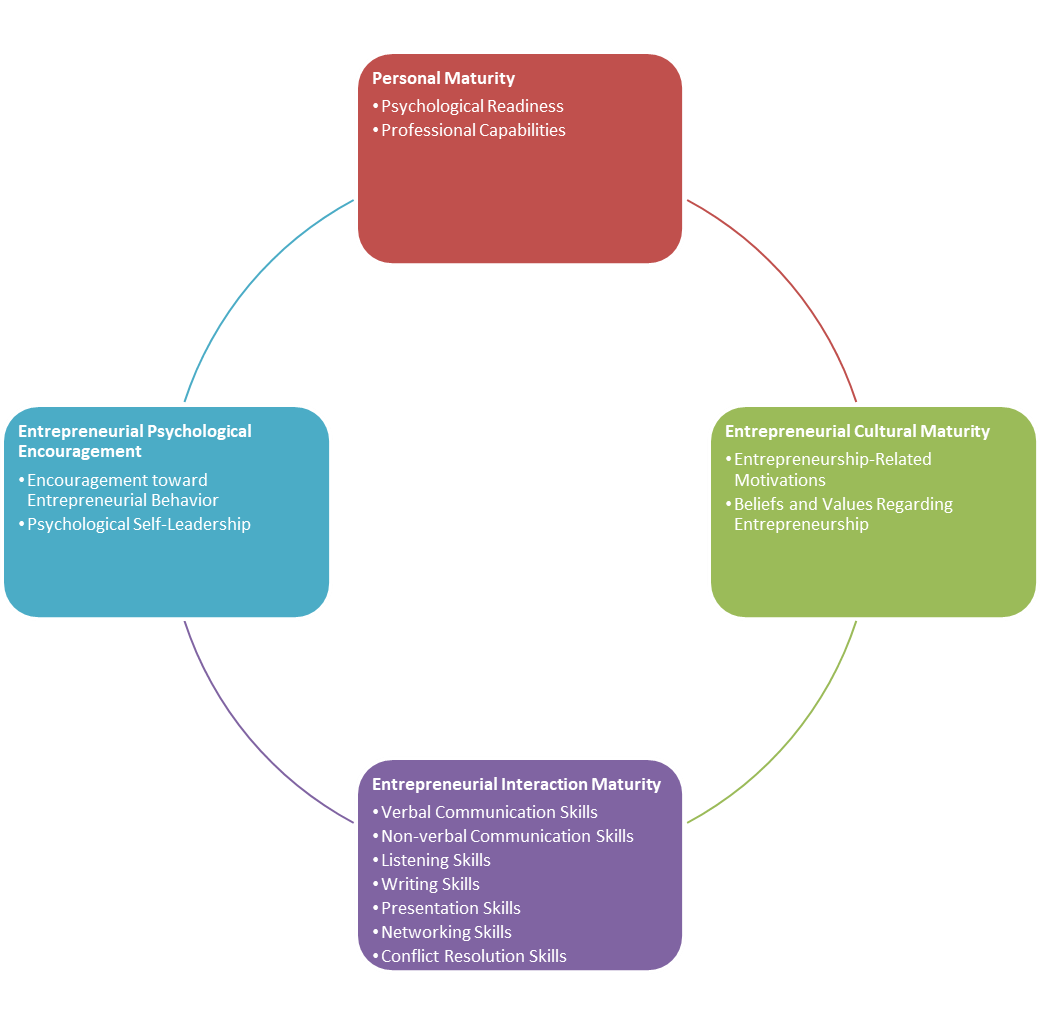Utilizing the Qualitative Content Analysis Approach to Present a Psychological Maturity Model for Research Managers Based on Entrepreneurial Development in Education-Oriented Organizations
Keywords:
psychological maturity, entrepreneurship development, education-oriented organizations, qualitative content analysisAbstract
Human resources with psychological maturity are among the essential assets required for fostering entrepreneurship in education-oriented organizations. When coupled with high-level professional skills, they become an unrivaled asset for these organizations and serve as the most critical potential factor for transformation, modernization, and the continued effectiveness of production, service, and educational sectors of society. This study aimed to present a psychological maturity model for research managers based on entrepreneurial development in education-oriented organizations. The statistical population consisted of experts, managers of education-oriented organizations, and university professors who have conducted research in the field of entrepreneurial development. The sampling method employed was the snowball sampling technique, leading to the selection of 15 experts. Data were collected using open-ended interviews and analyzed using the qualitative content analysis technique. Following open coding, axial coding, and categorization, several dimensions of psychological maturity were identified and introduced. Personal maturity includes components of psychological readiness and professional capabilities. Entrepreneurial cultural maturity consists of motivations related to entrepreneurship, as well as beliefs and individual values concerning entrepreneurship. Entrepreneurial interaction maturity encompasses verbal communication skills, non-verbal communication skills, listening skills, writing skills, presentation skills, networking skills, and conflict resolution skills. Entrepreneurial psychological encouragement involves components of encouragement toward entrepreneurial behavior and psychological self-leadership.
References
Y. Yin, L. Yang, and B. Liu, "Analysis on entrepreneurship psychology of preschool education students with entrepreneurial intention," Frontiers in Psychology, vol. 11, p. 1559, 2020, doi: 10.3389/fpsyg.2020.01559.
T. Haibin, "Application of Metaverse Technology in Entrepreneurship Education: A Systematic Review," International Journal of Academic Research in Progressive Education and Development, vol. 13, no. 1, 2024, doi: 10.6007/ijarped/v13-i1/20629.
A. Iri, m. Taghvaee Yazdi, and S. Saffarian Hamedani, "Analyzing the Ambivalence Elements of Entrepreneurship in the Technical and Vocational Organization of the Country," Sociology of Education, vol. 10, no. 1, pp. 172-182, 2024, doi: 10.22034/ijes.2024.2022254.1535.
C. Margaça, B. Hernández-Sánchez, J. C. Sánchez-García, and G. M. Cardella, "The roles of psychological capital and gender in university students' entrepreneurial intentions," Frontiers in Psychology, vol. 11, p. 615910, 2021, doi: 10.3389/fpsyg.2020.615910.
A. N. Zakharova, G. S. Dulina, and T. V. Talanova, "Psychological Readiness to Entrepreneurship of Economics Students," in Smart Technologies and Innovations in Design for Control of Technological Processes and Objects: Economy and Production, P. Springer International Ed., 2020, pp. 475-488.
M. McDonnell, Y. Yang, and Z. Zadhasn, "Linking Emotional and Social Competencies to Career Readiness Among Senior Undergraduates," (in eng), Iranian Journal of Educational Sociology, Research Article vol. 7, no. 1, pp. 198-204, 2024, doi: 10.61838/kman.ijes.7.1.19.
S. Mohammadi, G. H. Hosseininia, and M. Dastani Mobarakeh, "An Examination of the Mediating Role of Individual Entrepreneurial Orientation on the Relation Between Entrepreneurship Education and Entrepreneurial Intention," Journal of Entrepreneurship Development, vol. 16, no. Issue 5 (Special Issue), pp. 231-251, 2024, doi: 10.22059/jed.2023.355074.654141.
Z. Motamedi Nia, S. H. Movahed Mohammadi, A. Alambeygi, and H. Mahdizadeh, "Elements of the Isenberg Entrepreneurial Ecosystem Model in the Context of Agricultural Higher Education," Iranian Journal of Agricultural Economics and Development Research, vol. 55, no. 1, 2024. [Online]. Available: https://ijaedr.ut.ac.ir/article_81833.html?lang=en.
L. Heshmatifar, M. J. Liaghatdar, and A. Abedi, "Meta-Analysis of Psychological Correlates of Entrepreneurship in Iran," Career and Organizational Counseling, vol. 13, no. 1, pp. 55-70, 2021.
M. Frese and M. M. Gielnik, "The psychology of entrepreneurship: action and process," Annual Review of Organizational Psychology and Organizational Behavior, vol. 10, pp. 137-164, 2023, doi: 10.1146/annurev-orgpsych-120920-055646.
E. Alaa, J. Hatami, A. Ahmadi, and H. Aghajani, "Providing an Entrepreneurial University Model with a Psychological Maturity and Readiness Approach for Commercialization and Entrepreneurship (Empirical Evidence: Applied Science Centers in Mazandaran Province)," Management and Planning in Educational Systems, vol. 14, no. 1, pp. 157-184, 2021, doi: 10.52547/MPES.14.1.157.
M. Ranjbarfard and Z. Jangjoo, "A Review of Maturity Models in the Field of Business Process Management," Standards and Quality Management, vol. 5, no. 8, pp. 32-46, 2017.
M. Obschonka and M. Stuetzer, "Integrating psychological approaches to entrepreneurship: the Entrepreneurial Personality System (EPS)," Small Business Economics, vol. 49, pp. 203-231, 2017, doi: 10.1007/s11187-016-9821-y.
F. Abdelfattah, H. Al Halbusi, and R. M. Al-Brwani, "Cognitive style and fostering of technological adaptation drive E-entrepreneurial of new mature business," International Journal of Innovation Studies, vol. 7, no. 3, pp. 230-243, 2023, doi: 10.1016/j.ijis.2023.04.001.
A. M. Kolabi, "Strategic Renewal in Entrepreneurship Using a Mixed Research Method," Entrepreneurship Development Research Quarterly, vol. 15, no. 1, pp. 161-180, 2022.
Q. Miao and L. Liu, "A psychological model of entrepreneurial decision making," Social Behavior and Personality: an international journal, vol. 38, no. 3, pp. 357-363, 2010, doi: 10.2224/sbp.2010.38.3.357.
N. Hassanpour and H. Aghajani, "Providing a Model for Establishing University Accelerators with a Psychological Readiness Approach for Entrepreneurship (Empirical Evidence: Selected Universities)," Entrepreneurship Development Research Quarterly, vol. 15, no. 1, pp. 81-100, 2022.
T. Mahfud, M. B. Triyono, P. Sudira, and Y. Mulyani, "The influence of social capital and entrepreneurial attitude orientation on entrepreneurial intentions: the mediating role of psychological capital," European Research on Management and Business Economics, vol. 26, no. 1, pp. 33-39, 2020, doi: 10.1016/j.iedeen.2019.12.005.
M. Soleymanpour Omran, B. Esmaeili Shad, and F. Mortezavi Kiasari, "The Relationship Between Psychological Empowerment and Organizational Entrepreneurship with the Mediating Role of Entrepreneurial Opportunity Identification," Human Capital Empowerment Journal, vol. 1, no. 1, pp. 13-24, 2018.
K. P. Kumar et al., "Factors Affecting Entrepreneurial Psychological Certainty over Business Planning: A case of MSEs Sector in Benishangul Gumuz Regional State in Ethiopia," Journal of Positive School Psychology, vol. 6, no. 2, pp. 4725-4736, 2022.












